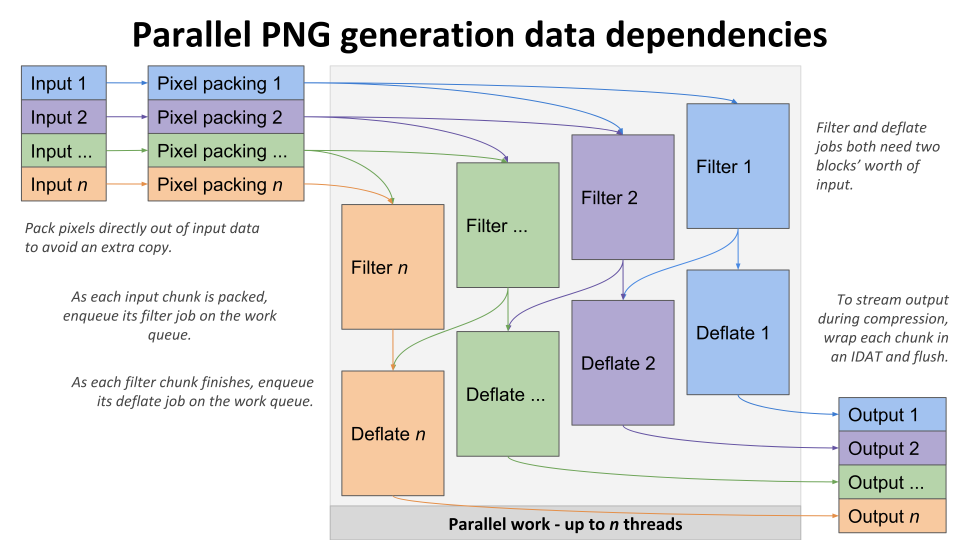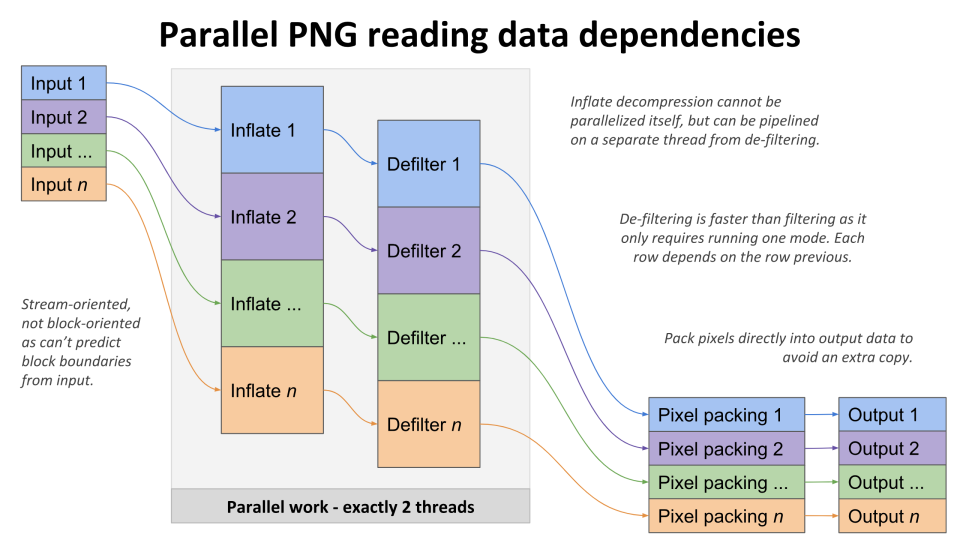A parallelized PNG encoder in Rust
by Brooke Vibber [email protected]
Compressing PNG files is a relatively slow operation at large image sizes, and can take from half a second to over a second for 4K resolution and beyond. See my blog post series on the subject for more details.
The biggest CPU costs in traditional libpng seem to be the filtering, which is easy to parallelize, and the deflate compression, which can be parallelized in chunks at a slight loss of compression between block boundaries.
pigz is a well-known C implementation of parallelized deflate/gzip compression, and was a strong inspiration for the chunking scheme used here.
I was also inspired by an experimental C++/OpenMP project called png-parallel by Pascal Beyeler, which didn't implement filtering but confirmed the basic theory.
Creates correct files in all color formats (input must be pre-packed). Performs well on large files, but needs work for small files and ancillary chunks. Planning API stability soon, but not yet there -- things will change before 1.0.
Performance:
- ☑️ MUST be faster than libpng when multi-threaded
- ☑️ SHOULD be as fast as or faster than libpng when single-threaded
Functionality:
- ☑️ MUST support all standard color types and depths
- ☑️ MUST support all standard filter modes
- ☑️ MUST compress within a few percent as well as libpng
- MAY achieve better compression than libpng, but MUST NOT do so at the cost of performance
- ☑️ SHOULD support streaming output
- MAY support interlacing
Compatibility:
- MUST have a good Rust API (in progress)
- MUST have a good C API (in progress)
- ☑️ MUST work on Linux x86, x86_64
- ☑️ MUST work on Linux arm, arm64
- ☑️ SHOULD work on macOS x86_64
- ☑️ SHOULD work on iOS arm64
- ☑️ SHOULD work on Windows x86, x86_64
- ☑️️ SHOULD work on Windows arm64
Compression ratio is a tiny fraction worse than libpng with the dual-4K screenshot and the arch photo at the current default 256 KiB chunk size, getting closer the larger you increase it.
Using a smaller chunk size, or enabling streaming mode, will increase the file size slightly more in exchange for greater parallelism (small chunks) and lower latency to bytes hitting the wire (streaming).
In 0.3.5 a correction was made to the filter heuristic algorithm to match libpng in some circumstances where it differs; this should provide very similar results to libpng when used as a drop-in replacement now. Later research may involve changing the heuristic, as it fails to correctly predict good performance of the "none" filter on many screenshot-style true color images.
Note that unoptimized debug builds are about 50x slower than optimized release builds. Always run with --release!
As of September 26, 2018 with Rust 1.29.0, single-threaded performance on Linux x86_64 is ~30-40% faster than libpng saving the same dual-4K screenshot sample image on Linux and macOS x86_64. Using multiple threads consistently beats libpng by a lot, and scales reasonably well at least to 8 physical cores.
See docs/perf.md for informal benchmarks on various devices.
At the default settings, files whose uncompressed data is less than 128 KiB will not see any multi-threading gains, but may still run faster than libpng due to faster filtering.
See the projects list on GitHub for active details.
A Cargo build process is used; note that libz_sys is pulled in which may build the zlib C library on some platforms that don't ship it standard like Windows.
There are two user-visible feature flags:
capibuilds and exports the C-compatible API symbols; only needed if you're going to link the resulting library with C/C++ code that calls itclibuilds the command-line tool for testing/demo as well as the library
To use mtpng in a pure Rust program, or only in the Rust part of a mixed C-Rust program, it is not required to use either flag.
Note: the Rust and C APIs are not yet stable, and will change before 1.0.
See the crate API docs for details.
The mtpng CLI tool can be used as an example of writing files.
In short, something like this:
let mut writer = Vec::<u8>::new();
let mut header = Header::new();
header.set_size(640, 480)?;
header.set_color(ColorType::TruecolorAlpha, 8)?;
let mut options = Options::new();
let mut encoder = Encoder::new(writer, &options);
encoder.write_header(&header)?;
encoder.write_image_rows(&data)?;
encoder.finish()?;See c/mtpng.h for a C header file which connects to unsafe-Rust wrapper functions in the mtpng::capi module.
To build the C sample on Linux or macOS, run make. On Windows, run build-win.bat x64 for an x86-64 native build, or pass x86 or arm64 to build for those platforms.
These will build a sample executable from sample.c as well as a libmtpng.so, libmtpng.dylib, or mtpng.dll for it to link. It produces an output file in out/csample.png.
Encoding can be broken into many parallel blocks:
Decoding cannot; it must be run as a stream, but can pipeline (not yet implemented):
Rayon is used for its ThreadPool implementation. You can create an encoder using either the default Rayon global pool or a custom ThreadPool instance.
crc is used for calculating PNG chunk checksums.
libz-sys is used to wrap libz for the deflate compression. I briefly looked at pure-Rust implementations but couldn't find any supporting raw stream output, dictionary setting, and flushing to byte boundaries without closing the stream.
itertools is used to manage iteration in the filters.
png is used by the CLI tool to load input files to recompress for testing.
clap is used by the CLI tool to handle option parsing and help display.
time is used by the CLI tool to time compression.
You may use this software under the following MIT-style license:
Copyright (c) 2018-2024 Brooke Vibber
Permission is hereby granted, free of charge, to any person obtaining a copy of this software and associated documentation files (the "Software"), to deal in the Software without restriction, including without limitation the rights to use, copy, modify, merge, publish, distribute, sublicense, and/or sell copies of the Software, and to permit persons to whom the Software is furnished to do so, subject to the following conditions:
The above copyright notice and this permission notice shall be included in all copies or substantial portions of the Software.
THE SOFTWARE IS PROVIDED "AS IS", WITHOUT WARRANTY OF ANY KIND, EXPRESS OR IMPLIED, INCLUDING BUT NOT LIMITED TO THE WARRANTIES OF MERCHANTABILITY, FITNESS FOR A PARTICULAR PURPOSE AND NONINFRINGEMENT. IN NO EVENT SHALL THE AUTHORS OR COPYRIGHT HOLDERS BE LIABLE FOR ANY CLAIM, DAMAGES OR OTHER LIABILITY, WHETHER IN AN ACTION OF CONTRACT, TORT OR OTHERWISE, ARISING FROM, OUT OF OR IN CONNECTION WITH THE SOFTWARE OR THE USE OR OTHER DEALINGS IN THE SOFTWARE.


